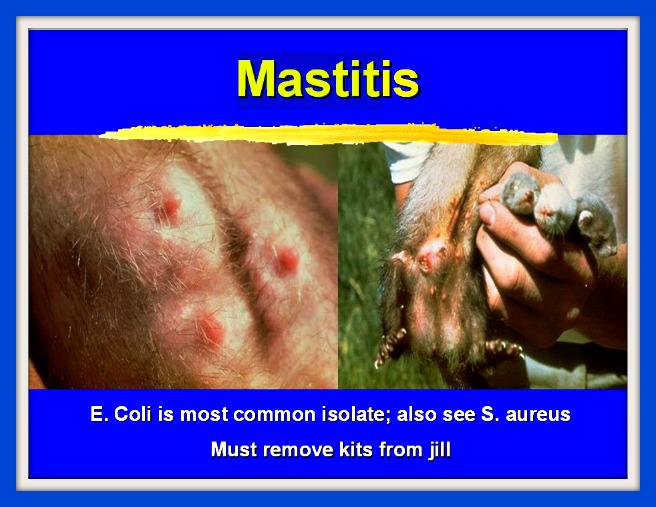[wp_ad_camp_1]
This can occur when the jill is feeding her kits soon after birth.
If you find that your jill’s teats are
 swollen
swollen hot
hot painful
painful reddish in color
reddish in color hard as marbles
hard as marbles
then please take her to the vet immediately.
If left untreated, the jill can become lethargic and stop eating, and could even die. She will also stop feeding the kits, so it is very important to get her to the vet quickly.
It’s usually caused by one of the following
- Streptococcus sp
- Staphylococcus sp
- Escherichia coli

Kiupel (used with permission) – Ferret Health Advancement at MSU
When Friskie had her kits, the poor girl developed mastitis and we had to take her to the vet for antibiotics. Thank heavens Fidget had kits at the same time so we were able to leave Friskie’s babies with her and her kits while we went to the vet.
I honestly don’t know what we would have done if we didn’t have Fidget to act as a surrogate mother to help out as poor Friskie had a very problematic time with giving birth and feeding her kits ?
[wp_ad_camp_3]
More information about Mastitis in Ferrets can be found on the following sites …
 Mastitis caused by hemolytic Escherichia coli in the ferret (NCBI)
Mastitis caused by hemolytic Escherichia coli in the ferret (NCBI)
 Mastitis in Small Animals by Mushtaq A Memon, BVSc, PhD, DACT (MSD MANUAL Veterinary Manual)
Mastitis in Small Animals by Mushtaq A Memon, BVSc, PhD, DACT (MSD MANUAL Veterinary Manual)
 Go Pets America :
Go Pets America :
Mastitis frequently occurs in nursing jills in early stages of lactation. Streptococcus sp., Staphylococcus sp., and Escherichia coli are the most frequent causes. Examination reveals enlarged, firm, slightly reddened mammary glands. Milk is expressed with difficulty. Hemolytic E. coli usually causes fulminating gangrenous mastitis, which is often accompanied by fever, lethargy, and extensive presence of the bacteria in the bloodstream. Aggressive and immediate attention to coliform mastitis includes surgical resection of the involved gland combined with ampicillin (10 mg/kg b.i.d.) and gentamicin (5 mg/kg, divided t.i.d.) therapy.
(Last updated November 2019)
DISCLAIMER: The information contained on this page is not meant to replace seeing a veterinarian if you think your ferret is ill. It’s only meant to supply general information on a particular illness which was obtained either from personal experience with my sick ferrets, or from books and/or the Internet.

Deprecated: str_contains(): Passing null to parameter #1 ($haystack) of type string is deprecated in /home4/kitchast/public_html/wp-includes/comment-template.php on line 2681